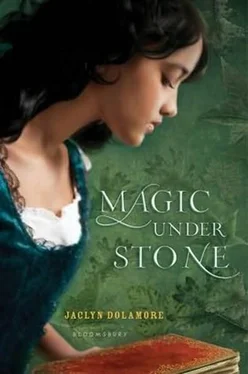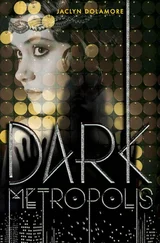I wanted to tell her that we ought to go back to Karstor’s apartment in New Sweeling, where I could pretend Karstor would take care of everything. But, truthfully, I feared we were in his way. And I knew he couldn’t take care of everything.
“We need to see Ordorio, one way or another,” I told her. “If you don’t know where he’s gone, I suppose we will have to wait for him.”
She nodded, the slightest smile crossing her lips. “I’ll show you what I’ve put up,” she said, unlocking the kitchen door.
When my father lost the family fortune to gambling debt, we had moved to the farm where my uncle grew fat root vegetables, along with a handful of fruit trees, and a few goats for milk and cheese. I had been surprised to see how poor and plain my cousins appeared compared to the children at court. Most of my fine things had been sold, but what was left still made their eyes bug, and I had shown it all proudly. They introduced me to their friends as “Nimira, from the royal palace,” their voices full of wonder.
That had lasted less than a week. I was asked to do more and more chores, and I did a poor job of most of them. They laughed when I complained about my dirty hands. They teased me mercilessly when I was afraid to milk a goat. They told all their friends I was snooty and mean, and at night I would cry silently for the dancing and the food and the servants at the royal court, hating the farm, hating my cousins, hating my mother for dying and my father for getting us into this mess.
That was why, when I was thirteen, I jumped at the chance to come to Lorinar, where I thought my singing and dancing would bring me fame and fortune.
There was one matter I had not wanted to admit.
Perhaps I had been a little snooty and mean to scorn hard work. There are things I didn’t see at twelve that I understood at seventeen.
I thought of these things, standing in the clean but lived-in kitchen, while Celestina took a match from a tin box and struck it, briefly releasing the stink of sulfur, and touched the match to a candle wick. I followed her down narrow steps to the dark cellar full of jars and crocks and boxes, with apples and pears neatly placed not to touch each other, all the fruits of her summer labors.
For a moment, she stood with a hand to her hip, directing the candlelight across glass jars that gleamed at the attention. “Blueberries, blackberries, raspberries,” she said. “We still have more apples to put up, but they’re almost there. Not many cherries this year, but peaches, and quince and crabapple jelly.”
“Do you do all of this yourself and take care of Violet too?” I hadn’t seen evidence of any other servants in the vast house.
She shrugged slightly. “There’s Lean Joe. He chops the wood and tends the grounds, and people don’t rob the place because he’s here, but I don’t see much of him. He’s the sort of old man who keeps to himself. And we send out the laundry. But people don’t want to work for Mr. Valdana. Hence the dust in the parlor.”
Finally, I could ask the burning question while remaining prudent. “I noticed he isn’t popular in town. Is it because he’s a sorcerer?”
“It’s not just that,” she said. She glanced back at the cellar door and started walking toward the light, as if she did not wish to discuss these things in the darkness. “I was five or six when he came back. They thought, for a long time, that he had died in the fairy war. I remember the stories about how he came home with a baby girl and his wife’s body, still looking half dead himself, and how his mother wept that he had come home. She died not long after his return, and that didn’t help the rumors either.”
My heart began to beat faster. The fairy war. That was where it had all began, where Erris had been turned from flesh and blood to clockwork.
She cut a slab of blueberry bread and offered it to me, then cut another for herself. “He was one of the sorcerers in the fairy war,” she said.
“I guess that when he left he didn’t trust fairies, like just about anyone else,” she continued. “He was such a great sorcerer at such a young age, people thought he would take care of everything.” She bit her lip. “That’s what my mother used to say. And then, he didn’t. He disappeared right in the middle of everything, because he had fallen in love with a fairy princess.”
“Oh,” I said. “That’s very… romantic.”
Celestina was slightly flushed. “It is, really. But no one around here thought so. I guess they were upset that their great hero fled the scene. They forgave him when they thought he was dead or kidnapped. But when he showed up again, the truth came out. At least a little. They thought he was a traitor.”
I wondered how she had come to work here. “You must have been scared of him.”
“I was, at first, just because that’s how everyone talked! But not anymore. No, when I came to work for him I was very apprehensive, but he’s a good man and he never avoided looking me in the face, but he never stared either.” She touched the mottled skin. “It was an accident with a lantern when I was fourteen.”
She made a little dismissive sniff as if to dispel the heavy mood. “So, it’s hard work here, but I’m happy. I have the run of the place, and it’s lovely. I’m glad he pays to send the laundry out, of course.”
I smiled. “Me too, if I’m to stay until spring.”
“So… Erris is… a clockwork man? What does it mean, exactly?”
“It means that his face and hands look real, but under his clothes his body is just… metal armature.” I could never explain without a horrified shiver sliding down my back. I couldn’t imagine being in his position. I couldn’t imagine what we would do if we couldn’t fix it. “Every night the clockwork winds down. And every morning, he must be wound.”
She was silent a moment. “The poor man. I don’t know how Mr. Valdana could possibly help him, but I hope he can.”
Celestina stood and took my empty plate. The bread had been delicious, giving me slight sympathy for Violet’s chagrin. “Shall we see how Violet and Erris are doing?” she said, and turned to the kitchen door. The white paint on the doorframe was full of thin scratches, which I guessed came from the gray tomcat sitting contentedly at the window.
We retraced our steps to the lawn. Ahead, Erris stood up and approached us. “I should find food for Violet while the sun is high,” he said. “Do you have a basket?”
Celestina ducked back into the kitchen and produced one.
“Violet should stay outside until I return,” he said. “Violet, if you get cold, ask Celestina for another blanket. I’ll be back.”
He smiled at me, and then turned to the woods, without the invitation I was hoping for. He wanted to be alone. I understood that, but it hurt me deeply all the same.
Celestina didn’t want to leave Violet outside by herself, and she sat down beside her. I didn’t want to listen to the girl prattle about her mother and how pretty she was.
“Do you mind if I explore the grounds?” I asked.
“Not at all,” Celestina said. “When Erris returns, I’ll show you to the guest rooms.”
The forest here felt very old, from the moment I stepped beneath the shade of the trees. The ground was carpeted in leaves and forest debris; I imagined it went down into the earth forever, centuries upon centuries of woods shedding their skin. But I didn’t look closely. I was too weary and lonely to look for birds or berries. This ancient place felt indifferent to my pain, which was an odd comfort-as if everything I felt was inconsequential.
I did not roam too far or too deep. I was afraid I might get lost, and besides, I didn’t know if there were wild animals here, or suspicious neighbors whose land I might stumble onto. I kept the great stone house in view.
Читать дальше












